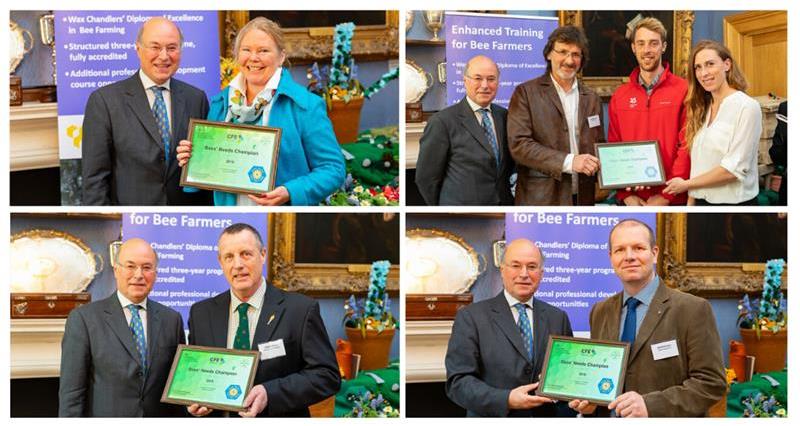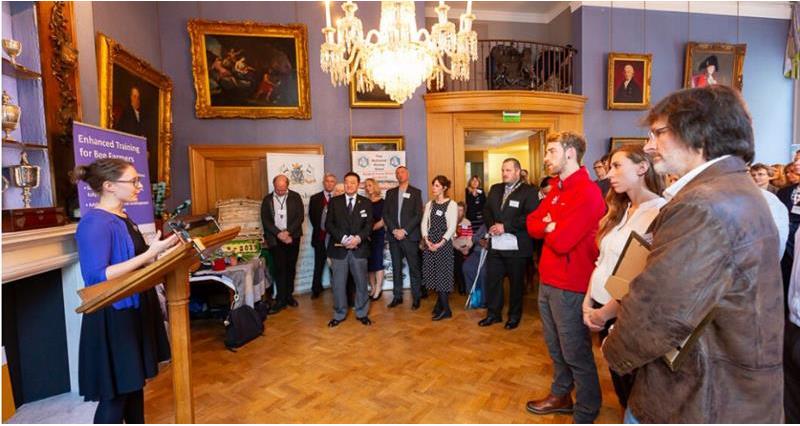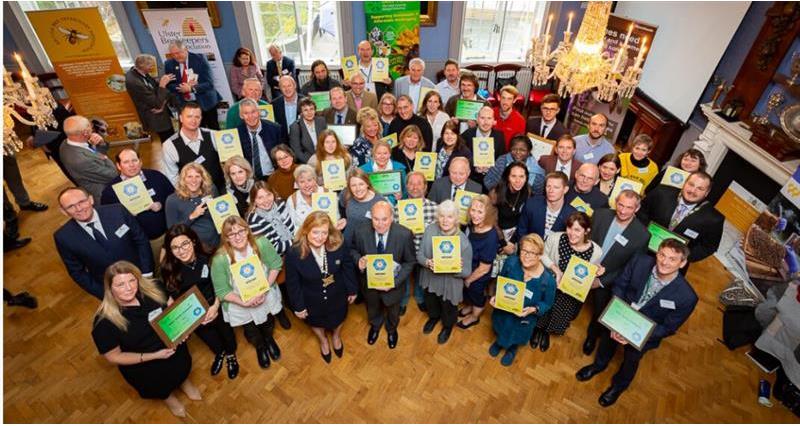For the first time, the fantastic work of farmers in protecting and enhancing the habitat of bees has been formally recognised through the Year of Green Action - Bees’ Needs Champions Awards 2019.
Hosted by Defra at the Wax Chandlers' Hall in London, Bees’ Needs Champions Awards saw winners from across the country come together to receive their awards from Lord Gardiner of Kimble, Minister for Rural Affairs and Biosecurity.
The worthy winners included community groups, local councils, charitable organisations and inspirational farmers:

Top left - Rebecca Sunang-Joret from the Hodnell Farm Partnership. Top right - Wayne Copp from Twitchen Farm
Bottom left - David Miller from the Wheatsheaf Farming Company. Bottom right - Martin Lines from Papley Grove Farm
- The Hodnell Farm Partnership makes laudable use of options under Countryside Stewardship to establish and maintain wildlife habitat on their 640 acre family farm in Warwickshire. Floristic margins offering pollen and nectar sources join a network of habitat on the farm, including ponds and grassy woodland edges.
Rebecca Sunang-Joret has also opened the farm gates to members of their village community to conduct wildlife surveys, sought advise from local wildlife groups on beneficial management techniques and is showcasing enthusiasm for establishing pollinator-friendly areas on farm to inspire other to follow their example. - Twitchen Farm showcases partnership working which delivers habitat for bees and other wildlife across a varied landscape in north Devon. On his 900 acre organic family farm Wayne Copp works with the National Trust and Natural England to graze sensitive habitat, including two SSSIs, with native Red Ruby cattle. Permanent pasture and clover and herbal leys offer food sources in field and 6 metre field margins in both arable and grassland fields provide additional food sources as well as nesting and hibernation sites for bees and other pollinators.
Evidence of the beneficial impact of Wayne Copp’s farming practices on can be seen in the recording sightings of brown-banded Carder Bee (Bombus humilis), a s41 priority species of national concern which has been spotted on forage resources made available through Wayne’s farming method. - The Wheatsheaf Farming Company in Hampshire is an excellent example of how bees’ needs can be met through measures incorporated into a large-scale, productive arable farming enterprise.
David Miller and the team at Wheatsheaf have established 4 metre pollen and nectar margins around all fields of the 3 farms which form the company, totalling 2000 acres of land. Companion and cover cropping extends the in-field flowering season and sensitive pest management has led to reduced insecticide use across the farm, benefiting many insects including bees and other pollinators. - Farm management on Papley Grove Farm in Cambridgeshire illustrates what can be achieved through a whole-farm approach which uses agri-environment scheme measures, additional voluntary activity and farmer innovation.
A mosaic of habitat is offered across the farm, established through pollen and nectar margins, food sources in cover crops, hedgerow and grassy-margin nesting and hibernation sites and bare ground for ground-nesting bees. Habitat is also connected by pollinator corridors throughout the farm and farm manager Martin Lines works with other local farmers and the local council to encourage pollinator resource in the wider landscape, including on road verges and a publicly accessible bridleway. - Stokehill (awarded in absentia) in south Somerset is a small, traditional holding on which the bee-friendly farm management is shared with the local community through exceptional engagement activity.
Sensitive cutting and grazing regimes on Stokehill’s hay meadow, native flowering hedges and grassy field corners provide food and shelter for bees and other insects, encouraging a rich diversity of species. Debbie Hicks at Stokehill also hosts a variety of public engagement events to showcase their nature-friendly farm practices and connect people with farm wildlife and green-space. These include school visits, teacher CPD programmes and adult health and well-being events.
Nomination and judging of the new farming category were overseen by Laura Harpham, Championing the Farmed Environment project officer. Laura spoke at the award ceremony about the importance of recognising the contribution of farmers to supporting populations of bees and other biodiversity on farmland, and the opportunities of inspiration and collaboration to encourage others to do more.

CFE looks forward to working with Defra and the Bees’ Needs campaign again next year. Guidance on farm management for pollinators can be found on the CFE website.
